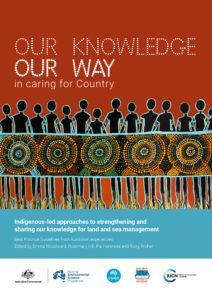
The Our Knowledge Our Way in caring for Country Best Practice Guidelines contain 23 case studies that highlight best practice for working respectfully and appropriately with Aboriginal and Torres Strait Islander peoples. Front cover artwork: Sharing the knowledge for caring for our Land. Copyright Emma Burchill, 2020.
Strengthening and appropriate sharing of knowledge is an underpinning principle of all NESP Northern Hub projects. The benefits of this approach have been highlighted in the Our Knowledge Our Way in caring for Country Best Practice Guidelines, compiled and edited by researchers from CSIRO and the North Australian Indigenous Land and Sea Management Alliance. These best-practice guidelines give a voice to Indigenous land and sea managers who have found good ways to strengthen their knowledge and build partnerships for knowledge sharing in caring for Country. A key takeaway for government, non-government and academic organisations who are interested in building partnerships with Traditional Owners across Australia for land management is to develop genuine partnerships that are founded on respect for Indigenous knowledge, culture and Country.
Aboriginal and Torres Strait Islander people have strong connections to Country. Country means more than just land – Country is the water, the plants, the animals. It is culture, stories, knowledge, ancestors and healing processes.
First of all, we are from Country, we are with Country and we are of Country. So from that perspective, what it does is it connects us even before we are born to a sense of place and to a life project of living and working with Country.
– Dr Anne Poelina, Chair, Martuwarra (Fitzroy River) Council, OKOW launch video
Aboriginal and Torres Strait Islander people own and manage around 46% of Australia’s National Reserve System and have knowledge systems that have developed over thousands of generations. Researchers and policy-makers working effectively with Aboriginal and Torres Strait Islander Peoples is central to solving some of the nation’s most complex environmental challenges and supporting alternative methods to manage the land and seascape.
However, ensuring appropriate processes and agreements are in place before Indigenous knowledge is shared, supports Traditional Owners to ensure their knowledge is used the ‘right way’ in land management and environmental research. Too often, ‘partnerships’ have been one-way or extractive arrangements.
In the past, sharing of our knowledge with others hasn’t always ended well. Mistakes have been made, and lessons have been learned but we’ve come together to identify ways forward.
– Our Knowledge Our Way guidelines authors, OKOW launch video
Hub researchers led by Dr Ro Hill from CSIRO and Ricky Archer from the North Australian Indigenous Land and Sea Management Alliance (NAILSMA) have been working on a project investigating knowledge brokering for Indigenous land management over the last five years. The project’s Indigenous-majority Steering Committee identified these guidelines as a key project output to support respectful and productive partnerships.
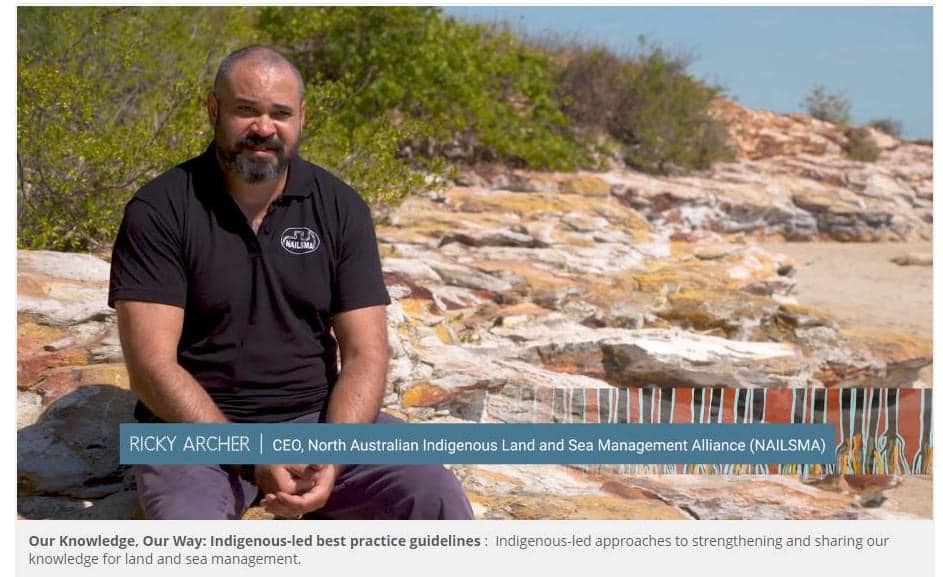
The Our Knowledge Our Way in caring for Country Best Practice Guidelines better value and strengthen Indigenous knowledge holders and the systems that need to be in place to protect Traditional knowledge, in a platform that can be readily accessed by the researchers and the broader community. One of the best examples that mixes cultural knowledge systems and Western knowledge frameworks is Savanna Burning Projects, a cultural burning practice that’s been put through an academic framework to measure things like carbon.
– Ricky Archer, CEO of NAILSMA and Djungan man from the Western Tablelands of north Queensland
The Our Knowledge Our Way in caring for Country Best Practice Guidelines contain 23 case studies that highlight best practice for working respectfully and appropriately with Aboriginal and Torres Strait Islander peoples.
The guidelines were developed over a four-year period and are based on 23 best-practice case studies from across the continent, from the Torres Strait to Tasmania, which were collected via a call out across Australia. Indigenous people contributed case studies which they identified as successful occurrences of knowledge sharing for land and sea management, research and enterprise development. Case study authors included Indigenous ranger groups, corporations and Indigenous enterprises who are at the forefront of Indigenous land and sea management. These case studies form the building blocks of the guidelines presented.
The guiding principle that underpins these guidelines and all the successful case studies, is that Aboriginal and Torres Strait Islander people must decide what is best practice for working with their communities and representative groups.
We need to take the time to listen and show respect for Aboriginal and Torres Strait Islander peoples’ knowledge, culture and Country, and be led by their knowledge. We have much to learn from Indigenous Peoples and so much more to achieve by working together. The case studies demonstrate clear, practical ways that groups who want to work with Indigenous groups and their knowledge on Country can do so the right way according to Indigenous people and what they want.
– Dr Emma Woodward, Our Knowledge, Our Way Guidelines editor, CSIRO
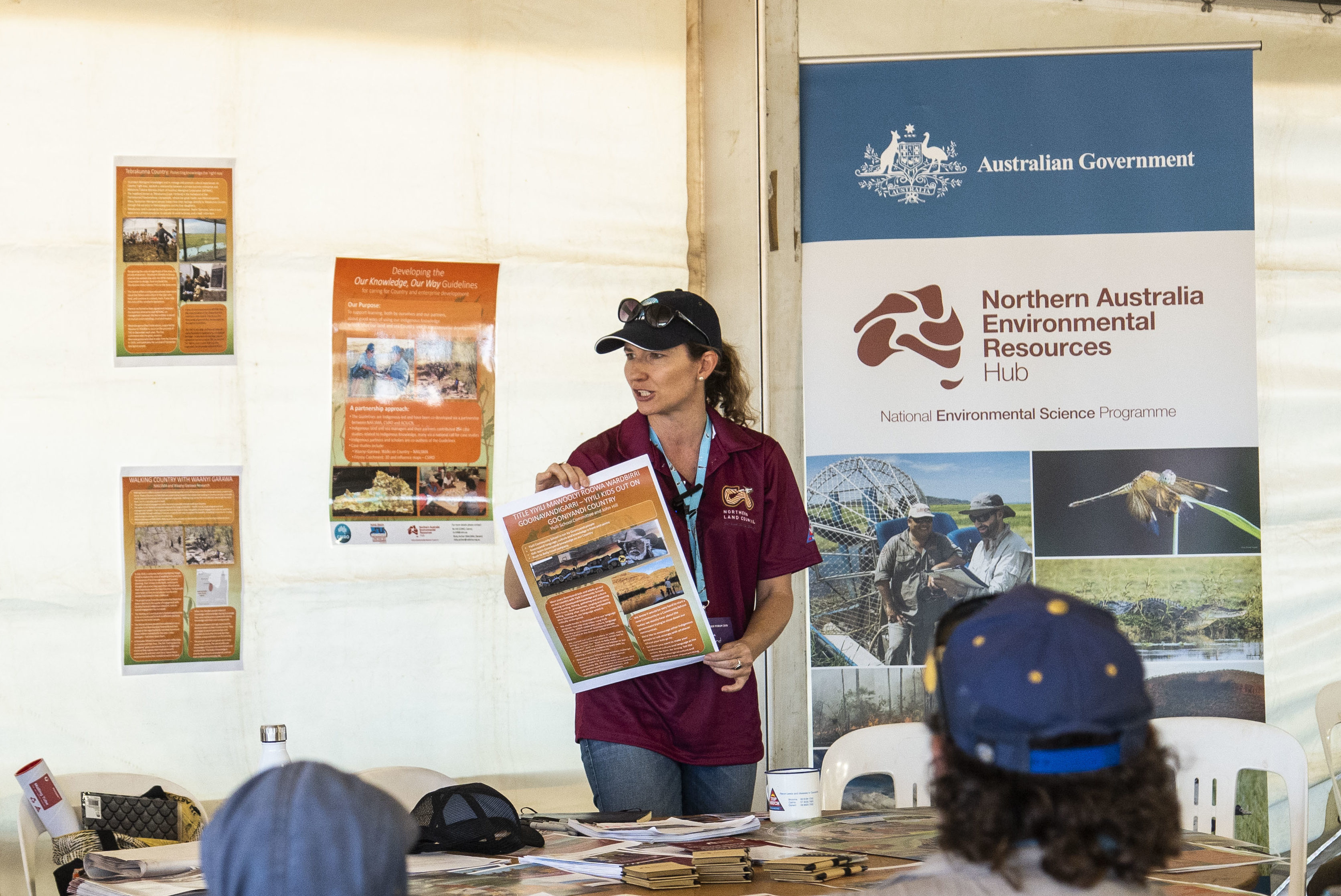
Dr Emma Woodward facilitates discussions about OKOW at the Northern Land Council Ranger Forum, 2019. Photo: NESP Northern Australia Hub.
The guidelines identify four key themes in actions towards best practice: strengthening Indigenous knowledge, strong partnerships, sharing and weaving knowledge, and Indigenous land and sea networks.
Strengthening Indigenous knowledge involves ensuring the right to access Country, listening to Country, interpreting that knowledge and communicating it to others. Maintaining strong Indigenous knowledge also requires strong cultural governance of Indigenous knowledge.
A key takeaway for government, non-government and academic organisations who are interested in building partnerships with Traditional Owners for land management is to develop genuine partnerships that are founded on respect for Indigenous knowledge, culture and Country.
Building strong partnerships can take time, but this time is essential for Traditional Owners to ensure their knowledge will be treated the right way.
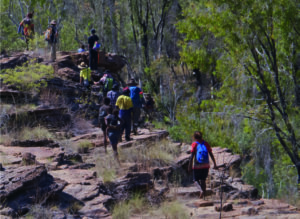
Walking on Country with Waanyi Garawa emphasised the importance of connection and access to Country. Photo by NAILSMA.
The project team identified the International Union for Conservation of Nature (IUCN) Best Practice approach as a framework for developing the guidelines and subsequently worked with the Australian Committee for IUCN to develop the ultimate product.
Our support for this publication reflects our acknowledgement and respect for Australia’s long and rich history of land and sea management by Indigenous Peoples, and their deep knowledge and expertise about a vast and changing continent.
– Peter Cochrane, Chair of the Australian Committee for IUCN and IUCN Councillor
The guidelines were launched in the middle of COVID-interrupted 2020 through a CSIRO-hosted webinar. More than 1,100 unique viewers tuned into the launch, with real-time feedback through the webinar overwhelmingly positive about compiling these case studies and principles in one location.
The attendees were predominantly researchers and other university staff, or local, state/territory and federal government workers. Other attendees comprised representatives from Indigenous organisations, land and sea management rangers, private organisations and industry.
The launch also premiered the Our Knowledge Our Way video, which included perspectives of Indigenous chapter lead authors and key partners and has been viewed nearly 2,000 times since the launch. The video highlights the gaps that existed before the guidelines were developed and how useful these guidelines are proving as a resource for research or land management partners wanting to partner with Traditional Owners.
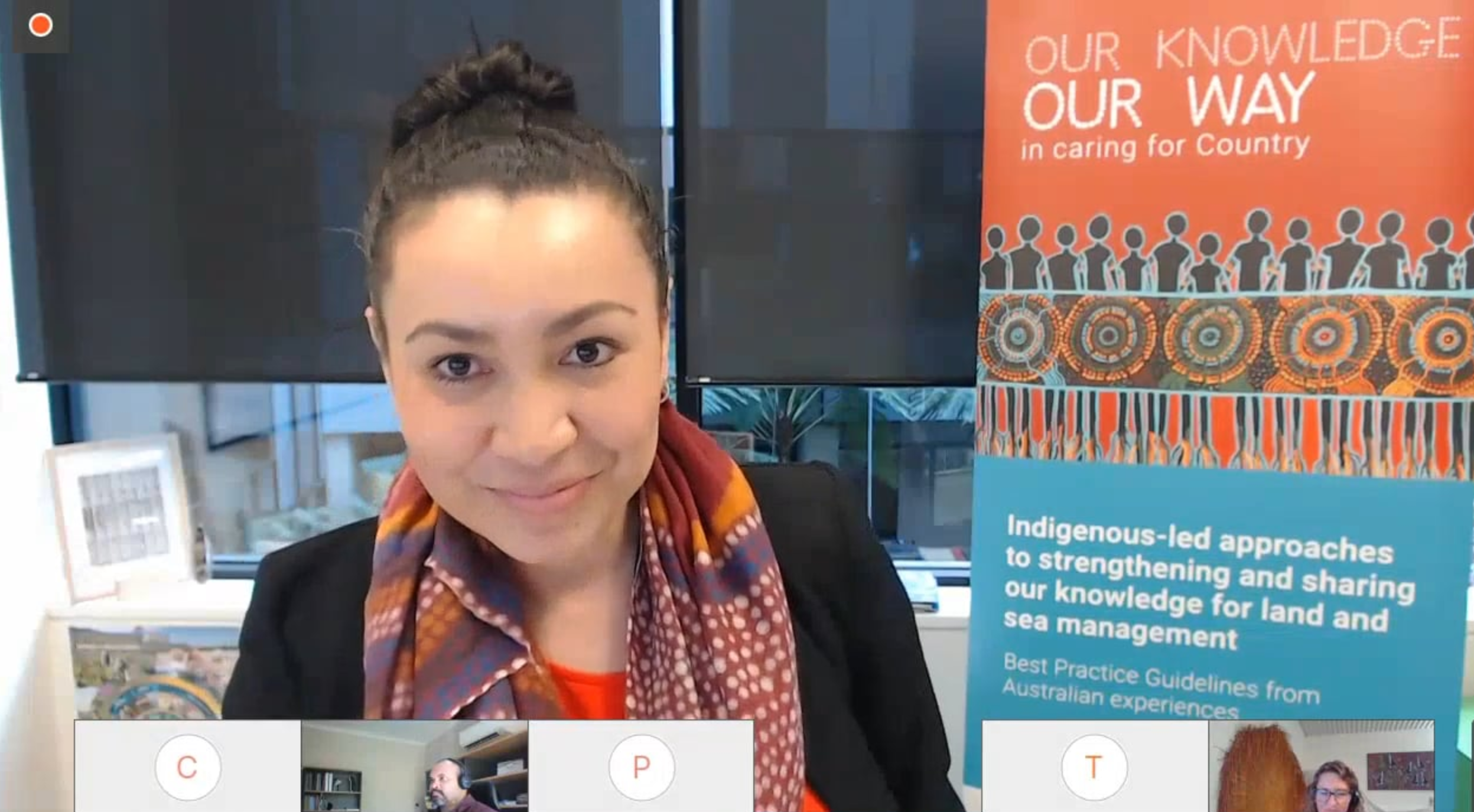
The launch webinar for the guidelines reached 1,100 people. In this screenshot from the launch webinar, Louisa Warren, CSIRO’s Executive Manager, Office of Indigenous Engagement, welcomes people to the launch.
The launch webinar was accompanied by a media release and social media activity from all research partners and supporters. Twitter activity included a reach of over 120,000 users and active engagement (tweets and retweets) was in the thousands.
Facebook posts reached ~50,000 users and articles on CSIRO’s ECOS and the NESP Northern Hub website were read 2,500 times.
The guidelines, summaries and individual chapters have also been downloaded 3,750 times across the various web locations where they are available for download.
Uptake of the guidelines has been swift.
The Australian Government’s Department of Climate Change, Energy, the Environment and Water’s new Corporate Plan features the guidelines as best practice for collaboration; and the State of the Environment Report (SoE) 2021 will include the guidelines as the standard for Indigenous engagement. When the draft scoping papers for the 12 themes of the SoE 2021 report went out for public comment in late 2020, each included specific reference to the importance and use of the Our Knowledge Our Way guidelines.
In their Indigenous Reconciliation Statement of Intent and Actions 2020–2025, the Fisheries Research and Development Corporation (FRDC) states that it will adopt the Our Knowledge Our guidelines to ensure that all those working on FRDC-funded research and other activities follow the correct manner of engagement and are aware of the underlying principles of the guidelines.
With strong leadership from a Bindjareb Noongar Eldership group, George Walley (Mandjoogoordap Dreaming) and the Western Australia Department of Water and Environmental Regulation have co-authored the Bring Together Walk Together Aboriginal Partnership Engagement Framework, which has been published on the Western Australian Government webpage Water and Environmental Regulation reconciliation action plan. The explanatory notes for the framework recommend that the Our Knowledge Our Way guidelines are referenced to support interpretation.
The team has also been approached by the federal Department of Defence, Intellectual Property Australia and the Western Australian Marine Science Institution seeking uptake to their own processes. In addition, The Nature Conservancy, a global non-government environment organisation, has distributed to all their staff globally.
Targeted policy briefings are in development for state, territory and federal government departments that focus on land and sea management, Indigenous Protected Areas and other relevant policy areas. These briefs will include practical examples for departments about how programs can best work with Traditional Owners for research, management and other activities on Country.
We truly hope that these guidelines prove useful to assist sharing and learning between Indigenous land and sea managers, to educate current and future partners, and to realise good outcomes for people and Country.
– The Indigenous-majority project Steering Committee
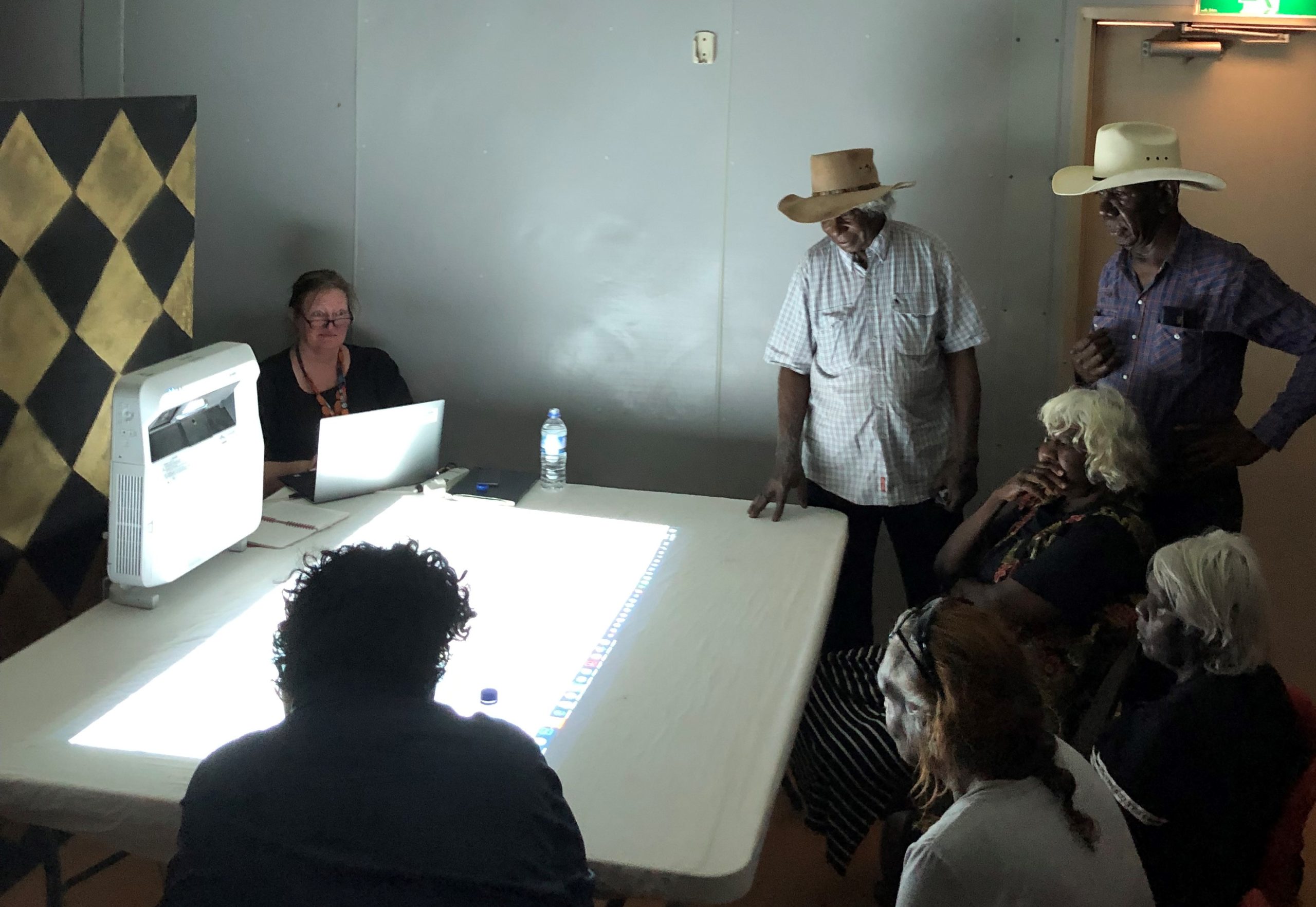
Workshop participants from different groups in the Fitzroy River catchment examining spatial data on the interactive projector with CSIRO researcher Nat Raisbeck-Brown. This project features as a co-developed case study in OKOW. Photo: Pia Harkness.
Strong partnerships are critical to successful research and land management programs. Working well with people and having sound collaborative processes – rather than flashy final products – are the most effective pathways to genuine impact from science and research programs. Bringing and weaving knowledge systems together and finding common ground between perspectives is a crucial step in strengthening respectful partnerships.
Sharing and weaving knowledge systems is really important, particularly in Indigenous land and sea management, perhaps where land and sea rangers want to draw on Western science approaches, including ecological modelling, to be able to demonstrate the impact they’re having on Country. Many of the projects that were described in the case studies in the guidelines refer to the impact and the importance of weaving knowledge.
– Dr Emma Woodward, OKOW launch video
These guidelines were created to support the development of the strong and fruitful partnerships that will be required to maintain much of Australia’s vast and unique land and seascapes for the health and wellbeing of all who live on this land and for future generations.
Research outputs
Scientific papers
Our Knowledge Our Way Guidelines
Reports
Factsheets
Videos and presentations
Impact stories
Media (selection)
Project webpage
Attributions
We acknowledge Aboriginal and Torres Strait Islander Peoples as the traditional custodians of the lands on which we work. We pay our respects to Elders of the past and present, and acknowledge their spiritual connection to Country.
Authors of the Our Knowledge Our Way Guidelines: Aboriginal Carbon Foundation, Aiken, M., Arbon, V., Atkinson, G., Bardi Jawi Niimidiman Aboriginal Corporation, Bieundurry, J., Birriliburu Rangers, Bourke, M., Bracknell, C., Brooking, G., Brooking, S., Brumby, W., Buissereth, W., Bulmer, V., Burarrwaŋa, D. Y., Bush Medijina®, Cameron, A. P., Cherel, V., Cherry, K., Chungalla, D., Clifton, A., Collard, T., Collard, Y., Cook, C., Cox, C., Cranbell, T., Daley, L., Dadd, U. L., Dann, R., Dann, R., Darug Ngurra, Dawson, M., Dhimurru Aboriginal Corporation, Foley, R., Ford, L., Forrest, J., Glass, P., Gore-Birch, C., Graham, M., Hand, M., Harkness, P., Hill, J., Hill, R., Hobbs, A., Hobbs, D., Hodge, P., Hunter, B., James, B., James, R., Jingle, E., Juboy, C., Juboy, P., Kimberley Land Council, Knight, O., Kogolo, A., Lemire, J., Lenard, B., Lenard, N., Lennard, C., Lennard, D., Lennard, V., Lincoln, G., Lyons, I., Malay, I., Malay, J., Malay, L., Malay, N., Malay, Z., Malmer, P., Marshall, D., Marshall, H., Masigalgal Rangers, Masigalgal RNTBC, McCall, E., McGrath, V., McLean, M., McMurray, L., McTaggart, P. M., Midmee, W., Millindee, L., Moggridge, B., Morton, S., Mowaljarlai, D., Mulladad, M., Myers, A., NAILSMA, Narwal, H., Nnarda, T., Norman-Dadd, A. C., Nuggett, J., Nulgit, C., Nulgit, L., Nulgit, P., Nyangumarta Warrarn Aboriginal Corporation RNTBC, O’Conner, M. H., Perkins, R., Phoka, C., Poelina, A., Poudrill, D., Prober, S. M., Raisbeck-Brown, N., Riley, P., Ross, J., Schultz, L., Scott, R., Shadforth, I., Shandley, J., Shaw, K., Skeen, S., Smith, G., Smith, A .S. , Smith, N., Street, N., Suchet-Pearson, S., Sunfly, A., Tengö, M., Thomas, P., Trakansuphakon, N., Trakansuphakon, P., Turner, A., Turpin, G., Turpin, M., Waanyi Garawa, Webb, T., Williams, B., Wiluna Martu Rangers, Wong, N., Wongawol, B., Woodward, E., Wright, S., Wungundin, H., Yamatji Marlpa Aboriginal Corporation, Yates, P., Yiyili Aboriginal Community School Board, Yuen, E., Yungabun, H.
Reviewers of the Our Knowledge Our Way Guidelines: Cowell, S., Davis, M., Fisher, J., Godden, L., Mackay, R., Mahoney, R., Major, D., Nursey-Bray, N., Taylor, P., Warren, L.